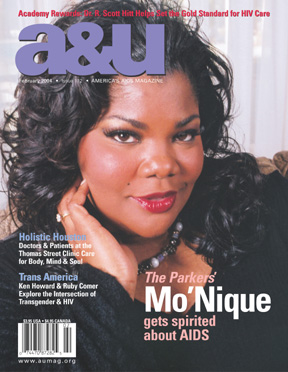Originally Published in A&U Magazine
Shortly before 8 a.m. one Friday, Dr. Gus Krucke enters his office inside his treatment area at the Thomas Street Clinic in Houston. He greets his right-hand assistant nurse Ed Rose. The two lovingly joke with each other while consuming the first of many cups of coffee which will be sipped throughout their hectic day. Like many of his patients, Krucke is openly gay.
Krucke reviews the first patient’s chart while Rose shows him into Krucke’s office. Listening to the patient’s heartbeat Krucke jokes, “It’s still beating! What are you worried about?” After carefully charting the patient’s comments and exam notes, Krucke shares the exam results with the patient, writes out several prescriptions, makes the patient’s next appointment and teases, “I’ll know where to find you if you miss your next appointment.”
With a unique bedside manner that develops patient trust and loyalty, Krucke is also a dynamo when it comes to professional training. Krucke is on staff at the University of Texas Health Science Center at Houston where he is an Assistant Professor of Medicine. Krucke practices at the Thomas Street Clinic, part of the Harris County Hospital District. He is dual board certified in Internal Medicine and Emergency Medicine. Prior to joining UT, Krucke was Vice Chair of Internal Medicine, worked in the Intensive Care Unit, and was Chairman of the Ethics Committee at a large county hospital in North Texas.
Krucke has treated HIV/AIDS patients throughout his career and joined UT because of its multidisciplinary approach to the treatment of HIV/AIDS. Krucke was attracted to the Thomas Street Clinic because it is one of the largest freestanding HIV/AIDS clinics in the U.S. It serves indigent patients, many of whom have received substandard treatment prior to coming to the clinic. Krucke-with his unique expertise in internal, emergency, and critical care medicine-has turned his large eight-bed treatment area into an urgent care center the likes of which hasn’t been seen at Thomas Street.
He treats patients in his clinic who would otherwise have to visit a hospital emergency department. This strategy avoids the agony of long ER visits, saves the district a lot of money and provides patients immediate, expert HIV/AIDS care. He oversees the administration of intravenous antibiotics, transfusions, and chemotherapy. Among many minor procedures, he performs suturing, incision and drainage of abscesses, skin biopsies, bone marrow biopsies, and spinal taps, often while tending to upwards of twelve to twenty patients in his office per day.
Committed to treating the entire patient, their emotional and psychological well-being along with their physical diseases, Krucke states, ”It’s best described as a strategy that employs medical care which addresses the body, mind, and soul of a patient.
At Thomas Street we are able to address these complicated and intertwined issues because patients have access to healthcare by folks like me, access to mental health services, social services, physical therapy, dietary counseling, pharmacy services, legal services, financial assistance, transportation assistance, among a host of other services. We believe in a more ‘holistic’ approach.”
Krucke even makes house calls, spending last Christmas away from his family. In 2002 he chose to spend Christmas in the small apartment of his patient dying from complications related to AIDS. She died peacefully in the early morning hours the day after Christmas with Krucke and family at her side.
Pity a healthcare professional or administration that settles for less than state-of-the-art treatment of Krucke’s patients. “HIV/AIDS treatment requires careful monitoring and many patients cannot survive treatment that isn’t performed to exacting standards.” When his patient’s life is on the line, Krucke doesn’t suffer fools well. The Ethics Committee Chairman in Krucke peeks out and remarks, “I took an oath to place my patients first. With all due respect to people who have or ever will employ me, my obligation to my patients’ well-being trumps all other concerns. I took a vow to be their advocate.”
At noon, Dr. Stanley Lewis, who recently left Thomas Street, drops by the clinic to visit Dr. Krucke. As Lewis walks through the hall, he can barely move without being ambushed by staff members and patients who miss him. Lewis specializes in the treatment of women with HIV/AIDS, most of whom are people of color. Lewis mentions, “Approximately seventy-five percent of HIV/AIDS patients are male but a large percentage of new infections are in women, of whom only ten percent are white, twenty-five percent are Hispanic, and the remainder are African-American.”
Lewis states, “There are two important moments in a person’s life. The first is when they are born. The second is when the person figures out why!” For Dr. Lewis, he experienced the second moment when he began treating women with HIV/AIDS.
Many of his patients are faced with a litany of challenges including poverty, single parenthood, substance abuse, not to mention social shortfalls and a lack of trust of the medical treatment made available to them. Lewis mentions, “Taking care of patients with HIV requires a commitment to dealing with both the medical and the psychosocial elements of a patient’s life. If you don’t know what’s going on in the home or in the mind and soul of the patient, you’ll never be able to treat them effectively, keep them compliant with HAART and living healthy.”
According to Krucke, “Dr. Lewis is an excellent clinician and an outstanding human being who is actively involved in HIV/AIDS research. He is a real role model.” Doctors Krucke and Lewis’s director, Dr. Philip Johnson, Division Head of General Internal Medicine at The University of Texas Health Science Center at Houston, practices medicine at the Thomas Street Clinic one day each week. Johnson says, “What sets Krucke and Lewis apart from most physicians today is that they relate to the communities that they serve in a multitude of ways. Dr. Krucke is a spiritual person who is totally committed to his patients. Dr. Lewis has the ability to listen and put his patients at ease. Yes, we need research and cutting-edge treatments of HIV/AIDS, but as importantly we need doctors who can treat the entire patient.”
One medical student who worked with Krucke remarked, “Dr. Krucke is the epitome of the perfect physician-he is knowledgeable, compassionate, and truly devotes 110 percent. Dr. Krucke is the ‘Patch Adams’ of the Texas Medical Center; he provides an extraordinary level of medical care with a touch of delightful and refreshing humor. I will never forget the smiles he was able to cast on his severely ill patients and for a brief moment help bring joy into their lives.”
John R. Selig is a freelance writer and photo-journalist living in Dallas. He contributed profiles and photographs and was a Consulting Editor for the book Uncommon Heroes and contributed to the book Telling Tales Out of School. He was one of eight activists on the National Steering Committee of StopDrLaura.com.

